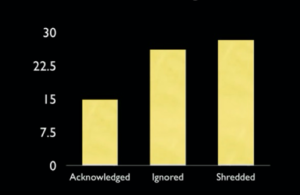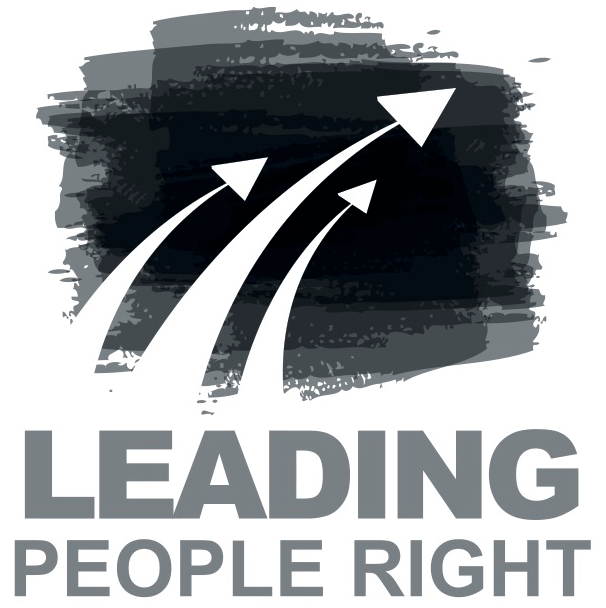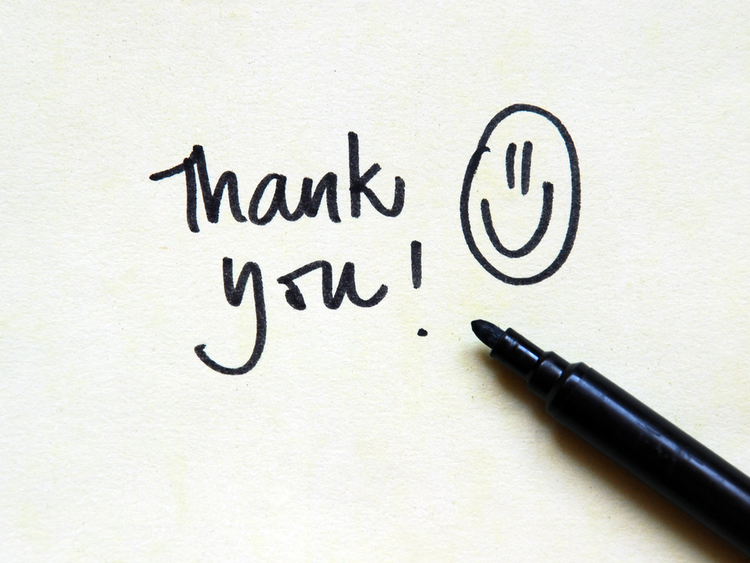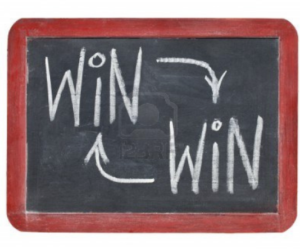While there is almost never ill intent, we're not in danger of over recognizing people. Acknowledgment, thank you and praise are powerful tools to help bring recognition to life. The feel good for those around your (and you) is significant.
So the headline is meant tongue in cheek, and admittedly in hopes, you say to yourself – I/we are not over recognizing people!
You aren’t alone, I promise. In general, we’re not in danger of over recognizing employees at work.
Whether in formal leadership or individual contributor roles, we each bare a responsibility for recognizing people that help and support our work. No one (who is successful anyway) believes they do it all alone. But there are disconnects and a deficit.
Many employees are unintentionally left hanging while achieving small victories of progress on challenging issues, delivering extra effort or exceptional outcomes, and overcoming adversity.
It’s not intentional though. Busyness, competing priorities, distance and the day’s fire drill intervene. These aren’t excuses for any of us. Instead, they are obstacles we all need to identify and overcome.
The incredible news – you can definitively make the working lives better for people who support you by recognizing them. There are few leadership habits more impactful and gratifying.
What a fantastic opportunity!
It Takes All Kinds
Recognition is a funny thing. It may be a head nod from the person you respect most in your field or a walk on stage at a formal award setting surrounded by hundreds of people in black tie. Each can be equally powerful.
The actual impact of recognition is quite a nuanced combination about the giver, the receiver, the form, and forum.
There are numerous studies about the role and importance of recognition for keeping employees engaged and connected to their contributions. I call it putting “gas in the tank” for people. Get it right, and you set people up for a good while.
Acknowledgment, thank you and praise are three power tools you can use.
Let’s Get The Money Off The Table
Kind of, but not really.
It needs to be well, acknowledged that recognition, as covered here, is outside of financial compensation.
Rewards matter. People work to get paid. Additionally, the relative nature of compensation, parity, and progression are all visible signs of recognition of contribution and impact.
This discussion is about something more personal frankly. It is one colleague saying something to another about their work. Recognizing people matters as does money – and is entirely in your control.
The Great British Baking Show
I know but stay with me.
The Great British Baking Show is a grueling (I’m serious) 10-week reality competition. The best amateur bakers in the UK compete against each other and the clock, completing a brutally broad array of baking challenges. The two judges, legendary bakers Paul Hollywood (again I’m serious) and Mary Berry require perfection. The judging includes excruciatingly detailed positive and negative feedback about every piece of their creations.
While infrequent when someone achieves perfection, Paul reaches out and shakes the baker’s hand. He is notorious for this rarely offered handshake. Their faces reveal how rare and essential this recognition in front of their competitors and the world. They are generally flush and speechless.
While they don’t compete expressly for Paul’s handshake, they desperately want to deliver the required excellence. The handshake is the sign. The associated praise and symbol of excellence they never forget. Striving for this level of excellence fuels every baker entering the show.

Acknowledgment: A Basic Human Want
Let’s start with the most basic of elements – acknowledgment. It means:
To notice or recognize by making a gesture.
So you ask for things from folks around you or on your team. People go off and work on them and deliver back to you.
How do you acknowledge these efforts, updates they give along the way? And does it matter if you do?
Dan Ariely’s popular TED Talk entitled What Makes Us Feel Good About Our Work pushes into this question – does it matter.
Check it out here.
He plays back the findings from a study he did. The focus was how people respond based on the level of acknowledgment they receive. The three scenarios are upon completion of their work it was:
- Quickly scanned and given an OK by the receiver
- Received/taken in hand but not looked at
- Immediately shredded
We can assume the low response on the part of those in the third group. The most interesting response was in group 2. The response levels were very low, almost identical to the shredded work. Not acknowledging (see graph above) the work was perceived nearly as poorly as tearing up the work. Wow!
Now What
The message – simple acknowledgment is an essential way of ensuring people don’t get demotivated for the work they do.
How does this translate for you?
You ask your people to do things – complete an analysis, get back to you with an update, prepare a report by a specific date. They send it in. A quick, “got it, will connect back with you once I review,” helps your team stay the course. I get that seems simple. It is.
The hard part is consistency — building habits and doing this during ultra busy times. The up and downside are, it matters.
Please And Thank You
Appreciation is a wonderful thing. It makes what is excellent in others, belong to us as well – Voltaire
So, there is raw power in saying thank you. Some do it often and exceedingly well. For others, a profound opportunity awaits!
As with all communication, the how of saying thank you is critical. However you deliver – in person, call, in writing – people remember how you deliver. A few basics:
- Timely – the closer to the work or contribution the better
- Be specific – what did they do and what was the impact
- Make it personal – it needs to be in your style/tone and authentic
Pick A Method
The reality is you will do all of these depending on the situation, person, and proximity. A few things to think about:
Face to face
Physically walking into someone’s office or traveling to someone (!) to say thank you is impactful. People are not sitting at their desk expecting you to show up with a thank you. Good surprises are good.
Phone call
Imagine it, they look down at their phone, see your name and think should I answer it or not. I’m reasonably sure a thank you call is not why most people think their boss or their bosses boss is calling. Next time they will answer!
In writing
The preference is a handwritten note if at all possible. No one gets personal notes (or very often.) Check out the Lost Art Of Thank You Notes. People keep handwritten thank you notes.
If you communicate on email, a subject header of thank you almost always gets opened.
Regardless the form, brevity, and specificity is your friend. And please, please proofread – thank you notes with mistakes erase the goodwill. I have received and regrettably sent a few with typos. Both felt awful.

Praise Inspires Excellence
Think about the Paul Hollywood handshake. You have the power to offer something of an equal impact on your people. Is there a particular moment or symbol you can create? It has to be something that’s true to who you are and delivered in a forum that makes sense.
Beyond the repeatable special moments, there are opportunities to call out excellence with a project, insights from an analysis, delivery of a presentation and handling complexity. Whatever the scenario, you are looking to identify performance excellence – this can be in the absolute or regarding profound improvement.
Specificity in your comments provides recognition and a form of coaching (and even inspiration) for continued achievement.
What Do We Want To Be Recognized For
Christopher Littlefield’s TED Talk, What Do We Want To Be Recognized For, forces us to think about the what part of the recognition equation.
Whether giver or receiver, he suggests we need to rethink our relationship with recognition.
He helps us realize that most of the time we don’t actually want to be acknowledged for the result, but for all the ups and downs, the challenges and barriers, we overcame to produce the result.
Do I Have To?
The answer is no. Recognizing people through using these approaches as part of your working habits is on you. So are the knock-on effects of not. People who are giving, give thanks. Beyond gratitude, it demonstrates humility.
I will say it is easy to spot the people in an organization who are good at this. They are the ones with a swarm of people who want to help them, want them to succeed and who generously provide their discretionary efforts.
There is a connectedness to all of this – how people get treated and how they perform. 9 Things People Do If They Want You To Be Successful As A Leader details more of this.
It Makes You Feel Better
Years ago I read advice that one of the best ways to get out of a funk is to get close to all the great work going on with the people you work with – and to do something about it. More times than I can count, I would get up from the phone and the desk and go looking for all the positive. It was there in abundance. Connecting with, acknowledging and thanking people was easy to do, natural and super energizing.
While people were always kind and appreciative of the engagement, honestly I got as much out of it as they did.
That is a win-win!
The Power Tools Of Recognizing People
Your time and attention to recognition provide the following:
- Acknowledgment tells people you notice and the work matters.
- Thank you helps keep people engaged by showing appreciation for their contributions. And it connects them to the outcomes.
- Praise inspires an unspoken but palpable motivation to strive for excellence.
Give those around you and yourself the gift of recognition.
Question: What are the special touches you use for recognizing people?





